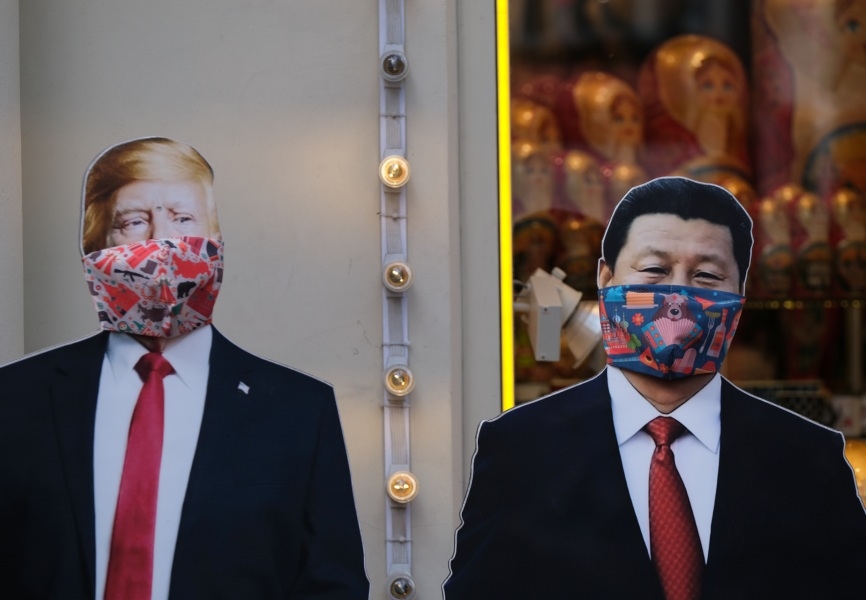The global coronavirus outbreak and the US's looming election have created new incentives for leaders in both the US and China to exploit existing bilateral tensions for political gain. President Donald Trump is looking for ways to deflect criticism over his administration's response to the pandemic and to rally his base ahead of what is shaping up to be a close contest in November. Similarly, President Xi Jinping is stoking patriotic sentiment in China to distract attention from the sharp falloff in economic activity caused by the coronavirus outbreak. Eurasia Group experts Michael Hirson, Jeffrey Wright, and Paul Triolo analyze the potential consequences of the added strain on the world's most important bilateral relationship.
Pandemic response
There is broad anger among the US electorate and political class over China's lack of transparency about the initial coronavirus outbreak. Both Republicans and Democrats will
embrace efforts to investigate and potentially punish China, though Republicans will have the added motivation of trying to divert attention from the Trump administration's own missteps. Despite the rising tensions, the two sides are likely to avoid sharp conflicts over critical medical issues. Still, if the tensions ratchet up too high—if the US, for example, presses the theory that the coronavirus originated in a leak from a Chinese lab and pushes for an international investigation—access to medical equipment and vaccines could become weapons in the conflict.
Geopolitical posturing
Beijing will assert itself in the coming months on issues about which patriotic sentiment and sensitivity is highest—such as Hong Kong, Taiwan, and the South China Sea—creating pressure for the US to respond. US firms and brands are potentially vulnerable to semi-official consumer boycotts in China as tensions on these issues rise. The unprecedented arrests by Hong Kong police of a slew of moderate pro-democracy figures is the latest sign that Beijing intends to fully assert political authority over the territory, including by preventing gains by the protest movement in Legislative Council elections in September. This strategy will fuel new public protests in the months ahead, possibly prompting the US to invoke provisions of the
Hong Kong Human Rights and Democracy Act passed last year, potentially including sanctions on Chinese and Hong Kong officials. The two sides are already stepping up their war of words over Taiwan and the South China Sea. The most serious danger is posed by accidental collisions of naval vessels in the East China Sea and South China Sea, creating a potential foreign policy crisis that in the current climate would be difficult to easily defuse.
Trade disputes
Trump has strong reasons to be cautious about the impact of tensions on trade and the economy. He is now
in a competitive race with Joe Biden as the economy enters a deep recession, unemployment skyrockets, and markets wobble. In recent weeks he has expressed optimism that Beijing will abide by its purchase commitments under the
phase one trade deal and has been careful not to criticize Xi personally. But whether he maintains this caution will depend in part on
China's ability to show major progress, and soon, on purchases of US goods. Given the disruption to the Chinese economy from the pandemic, these purchases will fall well short of targets for this year, which were overly ambitious even before the crisis hit. But they may still be enough for Trump to claim some credit, and the president will be hesitant go on the offensive again in the trade conflict. If purchases fall flat, Trump will have less reason to pull his punches on aggressive measures against China, including technology restrictions. But he is still unlikely to impose new tariffs on China, given that these would mainly affect consumer goods and would be unpopular domestically.
Technological rivalry
The Trump administration has already signaled that the pandemic is no reason to slow technology restrictions against China—it has in fact pumped new life into
the agenda of China hawks eager to limit tech sales and transfers to the Middle Kingdom. Earlier this week the US Commerce Department significantly expanded the universe of firms in China potentially subject to export controls of national security sensitive technologies, including semiconductors. Even more significantly, the Trump administration is likely to continue with its efforts to hobble
Chinese telecommunications giant Huawei and prevent it from dominating the market for 5G equipment. The president is expected to sign off on cabinet recommendations to impose major new restrictions on foreign firms supplying parts to Huawei, with only an outside chance that he delays them in a gesture of goodwill toward Xi as he did with ZTE in 2018 to help preserve trade negotiations. Additional US actions could follow, including against targets such as commercial drone maker DJI, along with the revocation of all US operating licenses for Chinese state-owned carriers. At the very least, Beijing will respond to these measures by redoubling efforts to reduce its reliance on the US in critical areas of technology—furthering momentum behind
technology decoupling between the two countries. But Chinese officials could also step up direct retaliation, including by finally unleashing their long-threatened “unreliable entities list,” affecting a small but significant set of leading US tech companies and their sales in China.
Learn more:

 Cardboard cutouts of US President Donald Trump and Chinese President Xi Jinping wearing face masks in Moscow, Russia. REUTERS.
Cardboard cutouts of US President Donald Trump and Chinese President Xi Jinping wearing face masks in Moscow, Russia. REUTERS.